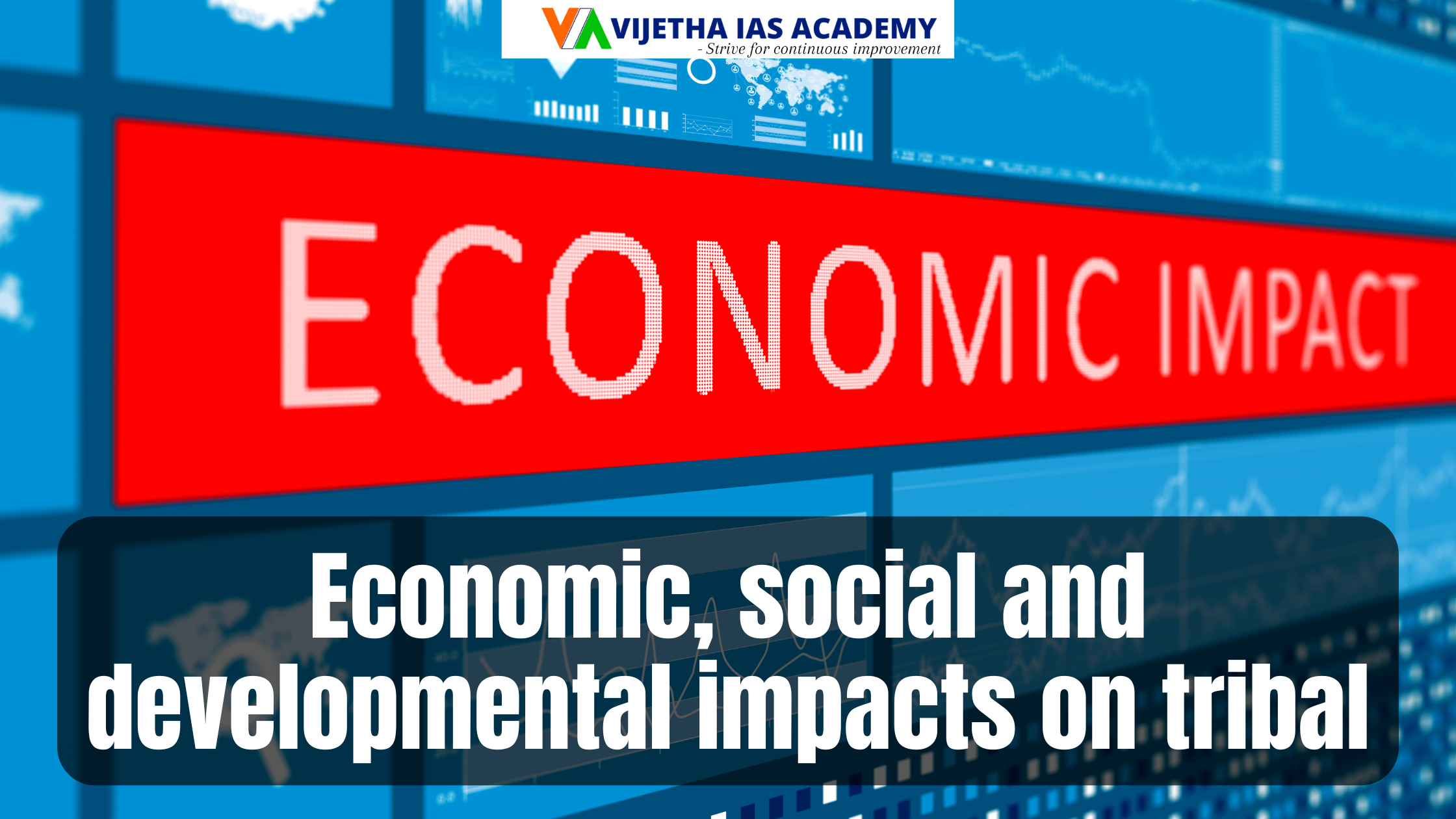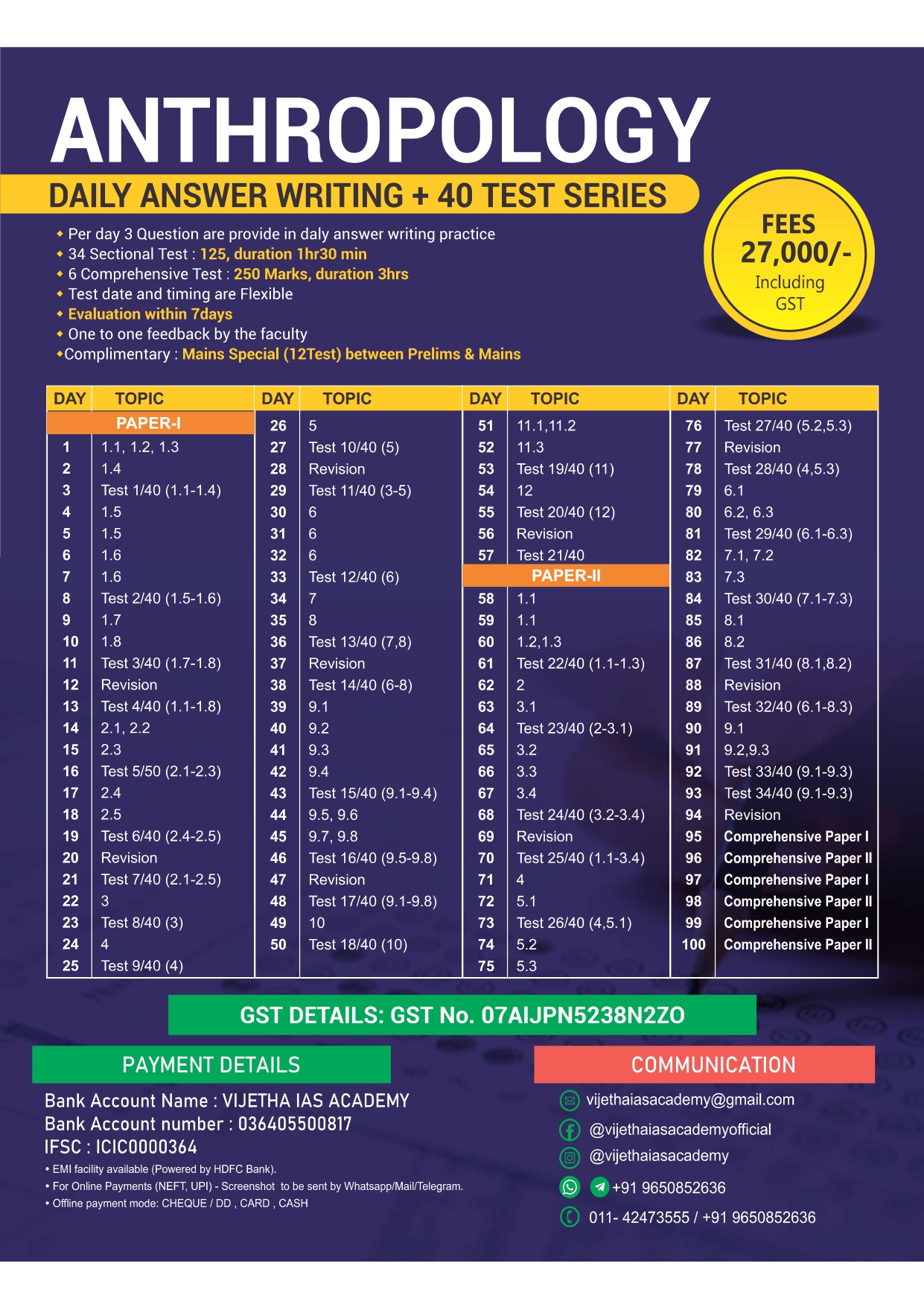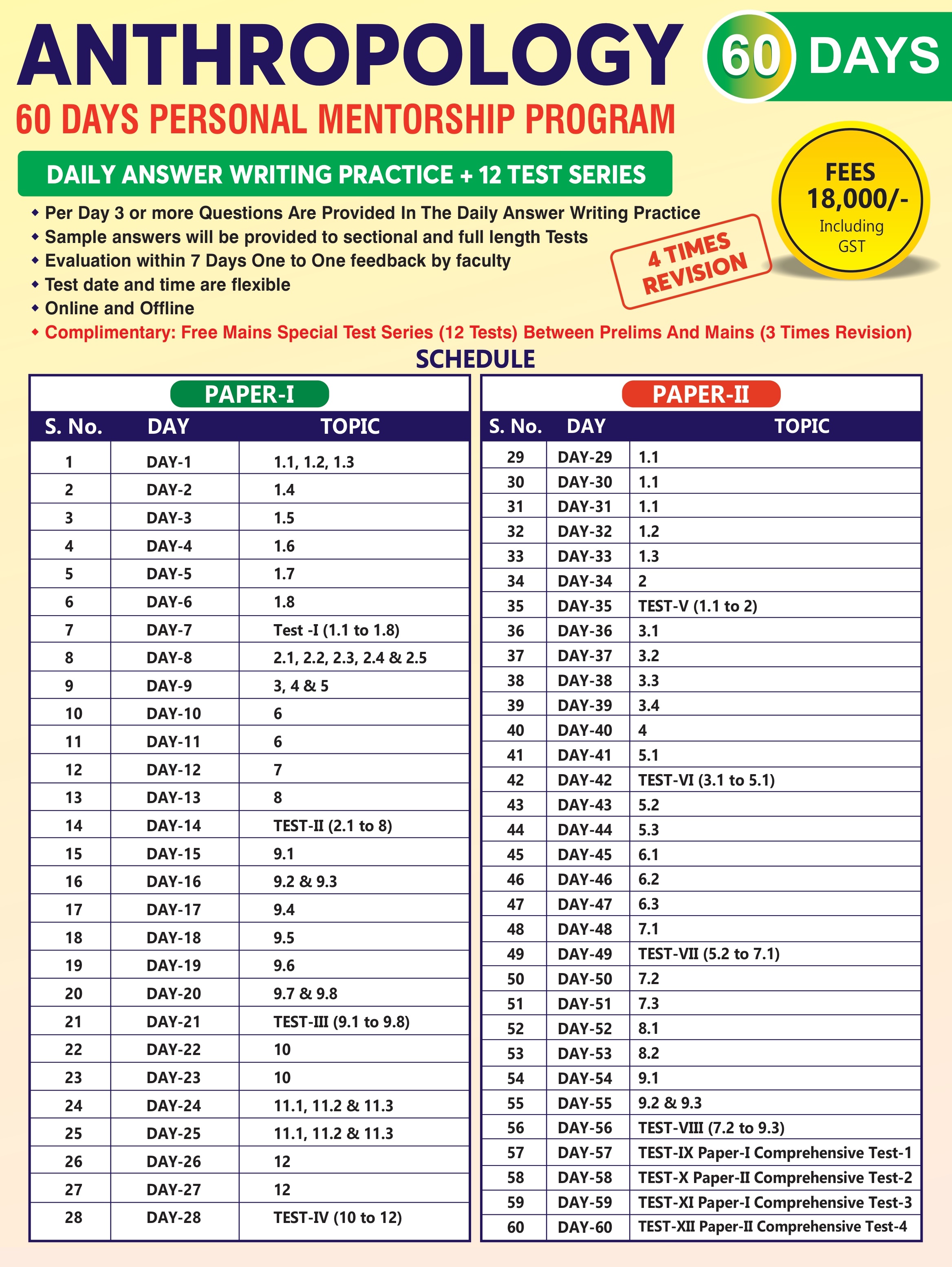
Discuss the economic, social and developmental impacts on tribal communities with special reference to mining.
(15 Marks) Anthropology Optional Paper CSE 2024
Introduction
Tribal communities, especially in India, are often located in regions rich in natural resources such as minerals, forests, and water bodies. Over the years, mining activities have become a significant source of revenue for states and corporations, but they also pose serious challenges for tribal populations. While mining has potential economic benefits, it often leads to the displacement of indigenous people, disruption of traditional livelihoods, and environmental degradation, leading to complex economic, social, and developmental impacts on tribal communities.
Main Body
Economic Impacts on Tribal Communities:
Loss of Traditional Livelihoods: Tribal communities are often heavily dependent on agriculture, forest produce, and subsistence farming. Mining projects, which require large tracts of land, displace communities and destroy their natural resources, cutting off their traditional means of income and sustenance.
Displacement and Inadequate Compensation: Many mining projects result in the displacement of tribal communities, forcing them to leave their ancestral lands. Compensation provided is often inadequate, and alternative employment opportunities promised by mining companies are not enough to sustain displaced families.
Temporary Economic Opportunities: On the positive side, mining can generate short-term employment for local tribal workers. However, these opportunities are usually low-paying, unskilled jobs, and the economic benefits tend to bypass the broader community as mining profits are concentrated among corporations and urban centres.
Social Impacts on Tribal Communities:
Displacement and Loss of Cultural Identity: Mining projects often lead to the displacement of tribes from their ancestral lands, which are not only an economic resource but also hold cultural and spiritual significance. Forced relocation disrupts their social fabric, leading to the erosion of traditional knowledge systems and loss of cultural identity.
Health Impacts:
Mining activities can lead to pollution of water bodies, deforestation, and air pollution, all of which negatively affect the health of nearby communities. The influx of workers from outside the tribal areas often introduces diseases, as tribal communities have limited access to healthcare.
Social Disintegration: The disruption caused by mining operations often leads to the fragmentation of tribal communities. Traditional social structures and leadership patterns are undermined as tribes are forced to integrate into mainstream society, which may marginalize their customs and way of life.
Developmental Impacts:
Infrastructure Development: Mining operations typically bring in infrastructure development such as roads, schools, and healthcare facilities. However, the benefits of these developments are often limited, as they are primarily designed to serve the needs of the mining industry rather than the tribal populations.
Lack of Sustainable Development:
While mining contributes to state and national revenues, its long-term sustainability is questionable. The environmental degradation it causes can lead to a depletion of resources necessary for the long-term survival of tribal communities. Mining-induced deforestation and soil degradation severely impact local agriculture and biodiversity, upon which many tribes depend.
Government Policies and Legislation:
Various policies, such as the PESA Act (1996) and the Forest Rights Act (2006), aim to protect tribal rights, particularly in decision-making related to land and resources. However, these laws are often poorly implemented, and mining companies sometimes bypass legal frameworks, leading to tribal displacement without adequate safeguards.
Examples of Mining Impact on Tribal Communities:
Niyamgiri Hills (Odisha): The Niyamgiri Hills, home to the Dongria Kondh tribe, faced a significant threat from a multinational corporation's proposed bauxite mining. The mining project was halted after protests and legal battles, highlighting the tribe's dependence on the hills for their culture, livelihood, and identity.
Jharkhand and Chhattisgarh:
These states, rich in coal and iron ore, have witnessed extensive mining activities, leading to the displacement of tribal communities such as the Santhals and Oraons. These communities face challenges related to environmental degradation, loss of forest rights, and inadequate rehabilitation measures.
Conclusion
Mining in tribal areas has led to a mixed impact on tribal communities, offering some short-term economic opportunities while causing long-term damage to their livelihoods, social structures, and environment. The displacement, cultural loss, and environmental degradation associated with mining often outweigh the developmental benefits promised by these projects. To ensure sustainable development, policies need to be better implemented to protect the rights and interests of tribal communities. Empowering tribal populations through legal frameworks, sustainable livelihood programs, and community-driven development can mitigate the adverse effects of mining on these vulnerable communities.
Anthropology Test Series Programme (Online + Offline))
We provide Anthropology Daily Answer Writing a range of programs designed to cater to various stages of UPSC preparation. Whether you're just starting out, have attempted the Mains before, or are getting ready for Mains 2024, we have the right option for you. Allow us to assist you in choosing the course that best fits your needs.
|
Level of Preparation |
Test Series Program |
Test Series Content |
Test Schedule |
|
Self-study of Anthropology Optional |
Anthropology 100 Days Personal Mentorship Program |
Daily answer writing, 34 sectional tests, 6 comprehensive tests, and complementary Mains Special 12 tests (between prelims and mains) |
|
|
Revise whole syllabus through Daily Answer Writing Practice and Tests |
Anthropology DAW Mentorship Program |
Daily Answer Writing Practice and 8 sectional and 4 Full Length tests |
|
|
Revise whole syllabus through Sectional and Full Length Tests |
Anthropology Tier- I T-40 Test Series |
34 Sectionals and 6 Full Length Tests |
|
|
Written Mains earlier and need more practice |
16-Anthropology Tier II Test Series |
10 sectional and 6 Full-Length Tests. |
|
|
Cleared Prelims 2023 and are preparing for Mains 2023 |
Mains Special 12 Tests program |
8 Sectional and 4 Full-Length Tests |
ANTHROPOLOGY MAINS SPECIAL COURSES
Enroll in our Anthropology Mentorship Program today and take the first step towards achieving your UPSC goals!
1) If you are going for Self study of Anthropology Optional and looking for a Comprehensive Program that includes Daily Answer Writing, 34 Sectional tests, 6 Comprehensive tests, and Complementary mains special 12 tests (between prelims and mains), our Anthropology 100 Days Personal Mentorship Program is the perfect choice.
2) If you want to revise Whole Syllabus through Daily Answer Writing Practice and 8 sectional and 4 full length tests, then our Anthropology DAW Mentorship Program is the best fit for you.
3) If you want to revise Whole Syllabus through 34 Sectionals and 6 Full Length Tests then Anthropology Tier- I T-40 Test Series is for you.
4) If you have written Mains earlier and need more practice, then our 16-Anthropology Tier II Test Series is a great option. This test series includes 10 sectional and 6 full-length tests.
5) if you have cleared Prelims 2023 and are preparing for Mains 2023,our Mains Special 12 Tests program is a must-have. This program includes 8 sectional and 4 full-length tests to help you prepare for the big day.
For more information on Vijetha IAS Academy’s Anthropology mentorship programs Deatils : https://vijethaiasacademy.com/anthropology-test-series
Anthropology 100 Days Personal Mentorship Program ( 7 + 3 Times Revision )

Anthropology 60 Days Personal Mentorship Program ( 4 + 3 Times Revision )

For more information: https://vijethaiasacademy.com/anthropology-test-series
Details Of Anthropology Classes Program
Top Anthropology Optional IAS Coaching Center in Delhi Vijetha IAS Academy | Best Anthropology Optional IAS Coaching in Delhi
Fee Structure:
- Tier 1: Rs. 55,150/- (3 Years Validity of Offline/Live Batch)
- Tier 2: Rs. 42,000/-
- Tier 3: Rs. 36,000/-
Batch Size: 50 – 60 Students
UPSC Notes
Anthropology Optional IAS Coaching Notes, IAS Exam Preparation Booklets, IAS optional coaching Notes, UPSC Coaching Notes, Video Lectures, Live Classes with faculty, Chat Facility Available
Teachers Name: N P Kishore Sir
Past Result
- Last Years Result 2023
- 35 Total Selections in CSE 2023
Google Reviews: 4.9 out of 5 stars
Website: Vijetha Anthropology Optional IAS Coaching in Delhi (https://vijethaiasacademy.com)
Faculties of Vijetha IAS Academy
- N P Kishore Sir
Features
- Vijetha IAS Academy offers Online and offline Courses for better preparation of Anthropology Optional Strategy for UPSC in Delhi.
- For better Anthropology optional Exam Preparation, Vijetha IAS Academy Delhi Conducts the Motivational IAS Session.
- Vijetha IAS Academy provides you with the CASE STUDIES on the pattern of the real-time IAS Exam which is helpful for better preparation of the Best Coaching for UPSC Anthropology Optional Optional IAS Examination.
- DAW & WAW – Revision Through Daily & Weekly Answer Writing Practice is offered by Vijetha IAS Academy for better result of the Anthropology Optional IAS examination.
Advantages of joining Vijetha IAS Academy
- Best Faculties for Anthropology Optional IAS Coaching in Delhi
- Best facilities, infrastructure and updated Case Studies Booklets and Notes for better preparation of the Anthropology Optional IAS Examination in Delhi.
- Best result in Past years for Anthropology Optional Strategy for UPSC Examination in Delhi
- Best Rated coaching institute for Anthropology Optional IAS Examination in Delhi.
- Vijetha IAS Academy also provides recorded lectures videos, notes which is very helpful for better preparation of Anthropology Optional IAS Coaching in Delhi
Fees Structure of Vijetha IAS Academy
|
Tier 2 |
Tier 1 |
Tier 3 |
BATCH STARTS FROM |
|
42,000/- |
55,150/- (3 Years Validity Offline/Live Batch) |
36,000/- |
REGISTRATION – START |
Fees Structure of Vijetha IAS Academy
|
Course Name |
Fees Amount |
Course Duration |
|
GS Offline (Pre + Mains+ CSAT) with Essay+Answer Writing |
Rs.99,000 (Including GST) |
400+ Days |
|
GS Online |
Rs.18,999 (Including GST) |
400+ Days |
|
GS Mentorship Programme |
Rs.29,999 (Including GST) |
1 Year |
For more information on our courses, visit our Anthropology Courses page. Explore our Test Series and Online Courses for flexible learning options.
Vijetha IAS Academy
Add. 2nd Floor, 50, Shankar Road, Block 7, Old Rajinder Nagar, Rajinder Nagar, New Delhi, Delhi 110060
MOB. 096508 52636
Open 7 Am : Closes 9 PM
Keywords: anthropology 2024 question paper, Anthropology optional subject question paper 2024, Anthropology optional 2024 question paper, Anthropology Optional Coaching UPSC, Vijetha IAS Academy Anthropology, Anthropology crash course UPSC, Anthropology daily answer writing UPSC, Kishore sir Anthropology, economic impacts of mining on tribal communities, social effects of mining in Indigenous areas, developmental challenges in tribal regions due to mining.
